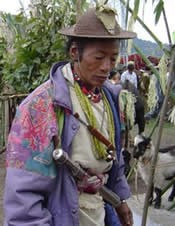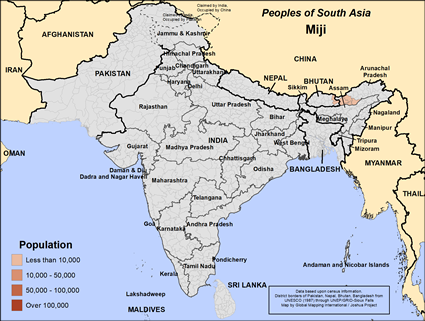There are three groups of Mishmis, namely the Digaru, Idu and Miju, each having their distinctive dialects. Their main economic resources are from the land (agriculture) and forest produce. Mishmis are known for their weaving skills, producing shawls, blouses, jackets, skirts, coats, bags and even other products such as bamboo baskets and bead-necklaces. They also trade in these products, yet they are one of the weakest tribes economically in Arunachal.
Mishmis are non-vegetarian. Men and children consume pork as well as beef; eating almost every part of the animal. However, their women eat the meat of small birds and fish. Their houses are made of bamboo and the roof is thatched with long grass. They are constructed on raised platforms, beneath which their domestic animals such as pigs and chickens are kept.
Mishmis are located in the state of Arunachal Pradesh, one of the seven north-eastern states in India.
The Idu Mishmi generally live in the Lower Dibang Valley, the Dibang Valley, Lohit and East Siang in Arunachal Pradesh of India.
They have a rich culture, tradition, costumes and customs. They mainly have an oral tradition and no script. However, recently they formed a script of Roman origin.
Mishmis follow hereditary shamanism, the most important characteristics of which are the concept of one supreme being and a complex system of beliefs based on nature and its spiritual qualities.
Mithun (a bison-like animal) and pigs are sacrificed in a number of rituals and pujas during festivals. Their world view is also influenced by their belief in good and bad spirits.
They are animistic and believe in the existence of spirits that govern the rule of nature. They do believe in the existence of ghosts (evil spirits). They pray to "almighty sun" and the divine spirit that governs the universe to look into their needs and that no curse be upon them.
Arunachal Pradesh is a culturally and religiously very sensitive state. There are restrictions for anyone from outside the state entering it or residing there. Any Indian national from outside the state requires a special permit from the government, whereas any foreign nationals are permitted to visit only for a short period and that too only as a tourist.
Arunchal is the first state in India, where a bill restricting change of religion was passed. Nevertheless, in the past several years, hundreds of people have become followers of Jesus. The Spirit of God has been working in the lives of the people and they are thirsty for the Word of God. The fast growing church requires the Word of God in the mother tongue, to establish strong, witnessing congregations.
Pray for the building of strong relationships with the Government for the overall development of the Mishmi community
Pray for training and guidance for the four personnel identified as mother tongue translators, as they start the translation process
Pray for both the Digaru and Miju to have gexcellent translations of Scripture that will effectively reach every Mishmi person, leading to their transformation
Scripture Prayers for the Miji in India.
| Profile Source: Anonymous |











